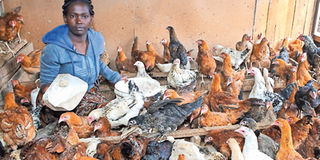Diary of a poultry farmer: One more reason to keep broilers

Mary Macharia feeds her kuroiler chicken in her farm in Elburgon, Nakuru County. Broiler chicken grow faster and are ready for the market between six and eight weeks. PHOTO | JOHN NJOROGE | NMG
What you need to know:
- Family support is very crucial in any business venture and you should thank your daughters for supporting your vision.
- A broiler chicken also grows faster and is ready for the market between six and eight weeks as opposed to Kienyeji chickens that take between five and six months to mature, thus, consume more feeds.
- The only way you’ll know if there’s market for your product is when it’s out there. To quote Steve Jobs, customers don’t know what they want until you’ve shown them.
This week, I answer all the questions you asked. I will start by talking Timothy out of an outdated idea that before venturing into you need to first identify a market for your products.
Githuku has been having sleepless nights pondering why I only rear Kienyeji chickens as opposed to the highly productive exotic breeds. Peter wants to team up with his daughters to start a poultry venture.
My two daughters have in the past tried poultry farming on small-scale, but they were not successful. They still think it is a good agibusiness worth trying. I retired about two years ago and I want to join hands with them and invest on a larger scale. I need expert advice before I start.
Peter Mbulo
Family support is very crucial in any business venture and you should thank your daughters for supporting your vision.
Build on their lessons and support. Second, besides access to capital and basic knowledge in poultry husbandry, being a successful farmer today also requires one to have a business mindset and entrepreneurial knowledge and skills.
Be ready to learn every day. Refer to my articles titled 11 things starters in poultry business ought to know and 10 habits to grow a poultry start-up available online.
****
If I’m not misguided, you don’t advocate for broiler chickens. Yet, I see that in Nairobi’s central business district, most fast-food eateries only serve broiler chickens with French fries and they’re full of customers.
I want to get it right so that I don’t burn my fingers. Do you also train on feeds for broilers?
Githuku Mungai
First, one of my main reasons for rearing only Kienyeji chickens was that these birds are resistant to diseases and don’t demand very high standards of husbandry.
It was, therefore, easy for me to learn basic animal husbandry practices like disease control, feeding and market trends and manage the risk-to-benefit profile.
On the other hand, although exotic breeds such as broiler chickens and commercial layers demand high standards of animal husbandry, they are very productive when it comes to eggs and meat.
In fact, according to the Ministry of Livestock and Fisheries Development 2012 data, although commercial layers and broiler chickens represent a mere 22 per cent of the total poultry population (6.8 million out of a total of 31 million birds), they account for almost half of the total meat and eggs produced.
A broiler chicken also grows faster and is ready for the market between six and eight weeks as opposed to Kienyeji chickens that take between five and six months to mature, thus, consume more feeds.
That means that if your target is mass market and fast food restaurants, then yes, keep broilers but don’t use antibiotics to promote faster growth or to prevent infections in the flock.
****
My long term plan is to keep both Kienyeji and broiler chickens. Lastly, my poultry feed formulation training covers commercial layers, Kienyeji and broiler chickens, geese, turkeys and guinea fowls.
I need your opinion on poultry farming, including start-up capital until I break even, projected profits for 500 layers, availability of market and risks involved.
Timothy Kaleyia,
Kajiado County
For a quick grasp of costs, refer to my article titled Home-made feeds save you fortune available online. Second, I find the idea that before you start a poultry venture, you first need to identify a market and buyers outmoded.
Although market outlets for poultry products are ill-defined and many farmers struggle to sell their eggs and meat, you can’t market a product that only exists in your head. You first develop the product and then look for customers.
The only way you’ll know if there’s market for your product is when it’s out there. To quote Steve Jobs, customers don’t know what they want until you’ve shown them.
Third, people who start a business with the idea that it’ll turn a profit quickly often get disappointed along the way and give up.
Lastly, entrepreneurship is not about selling things, it’s about providing solutions to problems that people really care about and are willing to pay for the solution. If you get this concept right, the product will sell itself.





